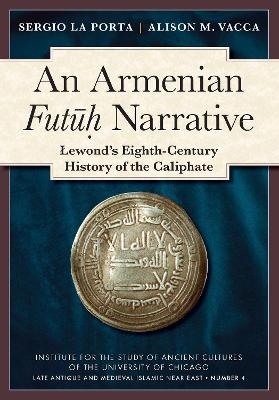
An Armenian Futuh Narrative
Lewond's Eighth-Century History of the Caliphate
Seiten
2024
Institute for the Study of Ancient Cultures (Verlag)
978-1-61491-095-4 (ISBN)
Institute for the Study of Ancient Cultures (Verlag)
978-1-61491-095-4 (ISBN)
The ‘History’ of the Armenian priest Lewond is an important source for the history of early Islamic rule and the only contemporary chronicle of 2nd/8th-century caliphal rule in Armenia. This book is a new annotated English translation of Lewond's text, which describes events during the century and a half following the Prophet Muhammad's death.
The History of the Armenian priest Łewond is an important source for the history of early Islamic rule and the only contemporary chronicle of second/eighth-century caliphal rule in Armenia. This volume presents a diplomatic edition and new English translation of Łewond's text, which describes events that took place during the century and a half following the Prophet Muḥammad's death in AH 11/632 CE. The authors address Łewond's account as a work of caliphal history, written in Armenian, from within the Caliphate. As such, this book provides a critical reading of the Caliphate from one of its most significant provinces.
Reading notes clarify many aspects of the period covered to make the text understandable to students and specialists alike. Extensive commentary elucidates Łewond's narrative objectives and situates his History in a broader Near Eastern historiographical context by bringing the text into new conversations with a constellation of Arabic, Greek, and Syriac works that cover the same period. The book thus stresses the multiplicity of voices operating in the Caliphate in this pivotal period of Near Eastern history.
The History of the Armenian priest Łewond is an important source for the history of early Islamic rule and the only contemporary chronicle of second/eighth-century caliphal rule in Armenia. This volume presents a diplomatic edition and new English translation of Łewond's text, which describes events that took place during the century and a half following the Prophet Muḥammad's death in AH 11/632 CE. The authors address Łewond's account as a work of caliphal history, written in Armenian, from within the Caliphate. As such, this book provides a critical reading of the Caliphate from one of its most significant provinces.
Reading notes clarify many aspects of the period covered to make the text understandable to students and specialists alike. Extensive commentary elucidates Łewond's narrative objectives and situates his History in a broader Near Eastern historiographical context by bringing the text into new conversations with a constellation of Arabic, Greek, and Syriac works that cover the same period. The book thus stresses the multiplicity of voices operating in the Caliphate in this pivotal period of Near Eastern history.
Sergio La Porta is Professor of Armenian Studies at California State University, Fresno. Alison M. Vacca is Associate Professor of Armenian Studies at Columbia University.
| Erscheinungsdatum | 14.05.2024 |
|---|---|
| Reihe/Serie | Late Antique and Medieval Islamic Near East |
| Zusatzinfo | 17 figs, 15 maps, 10 tables |
| Sprache | englisch |
| Maße | 178 x 254 mm |
| Gewicht | 1033 g |
| Themenwelt | Geisteswissenschaften ► Religion / Theologie ► Islam |
| ISBN-10 | 1-61491-095-2 / 1614910952 |
| ISBN-13 | 978-1-61491-095-4 / 9781614910954 |
| Zustand | Neuware |
| Haben Sie eine Frage zum Produkt? |
Mehr entdecken
aus dem Bereich
aus dem Bereich


